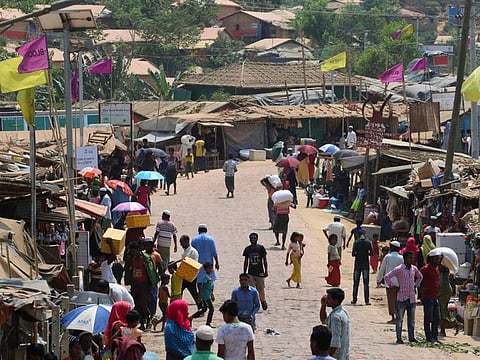COVID-19's impact on the world’s poor
There are many whose spirits appear bent under the weight of human grief

You are bottled up behind four walls, as expected of you by the strict rules of lockdown, social distancing and self-isolation, rules aimed at stemming the spread of Covid-19, a preposterously puny virus that on a nanoscale measures less than one thousandth the width of an eyelash, but a homicidal virus nevertheless that has killed more than 35,000 people and infected over 740,000 others in 190 countries around the world.
And never mind, given the fact that no man is an island, that isolation is known to increase the risk of depression and cognitive decline.
Consider the neighbourhood inhabited by Arabs in the global village, where literally millions of souls, displaced by conflict, hunker down in densely-populated refugee camps, all the way from Libya to Yemen, Syria to Gaza, Iraq to Jordan — camps where social distancing is physically impossible
Still, we hunker down, those of us around the world fortunate enough to be denizens of affluent countries, and shelter in place, using the challenge of social distancing, say, to sit back and read, at long last, Marcel Proust’s À la recherche du temps perdu (Remembrance of Things Past), practice our culinary skills — cooking with items ordered online — and watch Godfather I and II — and wait out the virus. (We hear that inventive Italians, under more stringent isolation rules than ours, have added their own touch: They “get together” on their separate porches to sing Rossini, Verdi and Puccini operas. So, well, each to his own.)
People in the affluent West, I say, can afford that luxury. But elsewhere, where the poor and the deracinated of the world live on society’s fringes, the challenges are daunting, if not altogether insurmountable.
Consider India as a case in point, a nation of 1.3 billion plagued by severe inequality, which has instituted a sweeping lockdown on its population in a desperate bid to stop the virus from spreading out of control. Millions of impoverished migrant workers, laid off work, became anxious to return to their villages hundreds of miles away, but with no trains and interstate busses to get them there, they found themselves with one option: Walk the distance.
“Chandra Mohan, a 24-year-old plumber in a suburb of India’s capital, left at 3am (local time) on Friday”, wrote Joanna Slater in a news report last Saturday filed for the Washington Post from New Delhi. “By mid-morning, he had walked 28 miles [45km], one bag on his back and another slung across his chest.
Also Read: COVID-19: At war with a Lilliputian monster
He still had more than 600 miles to go to reach his home in the state of Bihar. Mohan is one of thousands of people leaving India’s largest cities one footstep at a time in a historic exodus. So Mohan walked east with 17 other young men, all labourers like him. They were unsure of their route or where they would sleep or how they would eat, but one thing was certain: Without work, they cannot survive in the city.”
Slater quoted the wretched man as saying: “If we don’t die of the disease, we’ll die of hunger.”
And consider the neighbourhood inhabited by Arabs in the global village, where literally millions of souls, displaced by conflict, hunker down in densely-populated refugee camps, all the way from Libya to Yemen, Syria to Gaza, Iraq to Jordan — camps where social distancing is physically impossible.
Shelter in place
How, after all, do you tell these folks to wash their hands and wash them at all times when they reportedly have access to no more than 30 litres of water per day, barely sufficient for their drinking, cooking, bathing and laundry needs? And how do you, in the name of logic, tell homeless people like them to “shelter in place” and to “stay home to stay safe”?
It doesn’t take an epidemiologist to tell you that these camps are a perfect breeding ground for coronavirus, where it is very likely, very soon, to spread like wildfire and spiral from there to the rest of the region.
We throw the word “catastrophe” around so frequently that it has acquired a pedestrian connotation, but catastrophe, in its literal sense, is heading there. No ifs or buts about it.
Those living in the West — in the case of this columnist, a Palestinian, his presence there is a trick of fate played on him by history — have failed, despite our putatively sophisticated paradigms, to impose on human experience attributes of order and accord, as we have equally failed to understand the dynamic relationship between the structured environment we create and the response by the natural environment to that creation.
Let’s face it, there may be a dark side to human nature that the natural world has a beef with. Surely, epidemics are not visited upon us capriciously by the elements.
In the end, we will not get a penetrative grasp of the epic scale of this crisis unless we perceive how, at the heart of it all, lies the suffering that this brutish virus has inflicted on impoverished, uprooted people, all the way from the Indian subcontinent to the Middle East and North Africa — and countless other places in between.
Meanwhile, the devil with Swan’s la petite madeleine moment, with one’s special recipe for Beef Strogonoff and with Marlon Brando’s mesmerising performance as Don Corleone.
The fate of Chandra Mohan and others like him, whose lives appear in the time of Coronavirus to be outside the governance of either reason or justice and whose spirits appear bent under the weight of human grief, should overshadow everything else in our empathy charts.
Fawaz Turki is a journalist, lecturer and author based in Washington. He is the author of The Disinherited: Journal of a Palestinian Exile.



